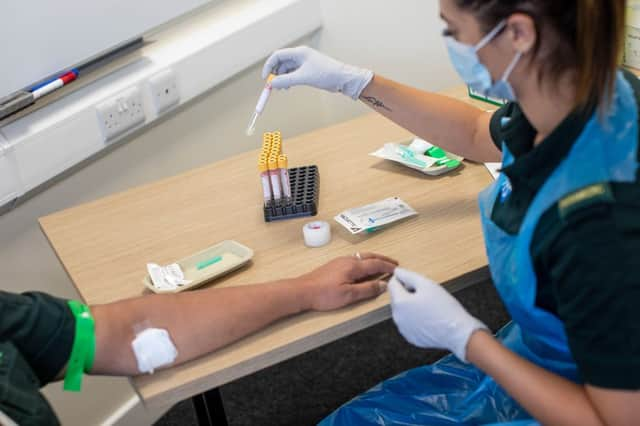New NHS blood test detects more than 50 types of cancer before symptoms show


A new blood test is being trialled by the NHS which can detect more than 50 types of cancer before symptoms appear.
Thousands of people will take part in the trial, due to start on Monday (13 September), to see how well the Galleri test works in the health service in the hope it could revolutionise cancer care in the UK.
Advertisement
Hide AdAdvertisement
Hide AdIt is being led by the Cancer Research UK and King’s College London Cancer Prevention Trials Unit together with Grail, which developed the blood test.
How does the test work?
The Galleri test is currently available in the US and can detect cancers that are not routinely screened for.
The blood test can pinpoint exactly where in the body the disease is coming from with a high degree of accuracy, which could help to improve early detection.
Catching cancer early is vital to ensure people receive treatment quickly before it has a chance to spread, meaning the test has the potential to save thousands of lives in the UK every year.
Advertisement
Hide AdAdvertisement
Hide AdIt works by looking for chemical changes in fragments of genetic code that leak from tumours into the bloodstream.
Some cancer tumours are known to shed DNA into the blood long before a person starts experiencing symptoms.
It has been found to be particularly effective at finding cancers that can be difficult to identify early, including head and neck, bowel, lung, pancreatic and throat cancers.
However, the test is not able to detect all cancers and will not replace NHS screening programmes currently in place, such as those for breast, cervical and bowel cancer.
Advertisement
Hide AdAdvertisement
Hide AdIn the US, it has been recommended for people at higher risk of cancer, including the over-50s.
Can I take part in the trial?
The NHS trial, which is the world’s largest, will see blood samples taken from 140,000 volunteers at several mobile testing clinics in retail parks and other community locations across eight areas of England.
Letters are being sent to people from different backgrounds and ethnicities aged between 50 and 77 asking them to take part.
Several NHS Cancer Alliances are supporting the plan, with people invited to take part from Cheshire and Merseyside, Cumbria, Greater Manchester, the North East, West Midlands, East Midlands, East of England, Kent and Medway, and South East London.
Advertisement
Hide AdAdvertisement
Hide AdParticipants, who must not have had a cancer diagnosis in the last three years, will be asked to give a blood sample at a local mobile clinic and will then be invited back after 12 months, and again at two years, to give further samples.
Half of the people involved in the trial will have their blood sample screened with the Galleri test straight away, while the other half will have their sample stored and may be tested in the future.
This will allow scientists to compare the stage at which cancer is detected between the two groups.
Anyone in the test group who is found to potentially have cancer will be contacted by the trial nurse and referred to an NHS hospital for further tests.
Advertisement
Hide AdAdvertisement
Hide AdNHS chief executive Amanda Pritchard said: “This quick and simple blood test could mark the beginning of a revolution in cancer detection and treatment here and around the world.
“By finding cancer before signs and symptoms even appear, we have the best chance of treating it and we can give people the best possible chance of survival.
“The NHS has a successful track record of leading the way on innovations in cancer diagnosis and treatment, from CAR-T therapy to Covid-friendly drugs.
“The Galleri blood test, if successful, could play a major part in achieving our NHS Long Term Plan ambition to catch three-quarters of cancers at an early stage, when they are easier to treat.
Advertisement
Hide AdAdvertisement
Hide Ad“So if you are invited, please take part – you could be helping us to revolutionise cancer care and protect yourself.”
The first results from the study are expected by 2023 and if successful, the NHS in England plans to extend the rollout to a further one million people in 2024 and 2025.
Is the test effective?
Research published in June in the journal Annals of Oncology found that the test had a very low false positive rate, meaning very few people would be wrongly diagnosed with cancer.
In a test of 2,823 people with cancer, and 1,254 without, the test correctly identified cancer in 51.5 per cent of cases across all stages of the disease, while only 0.5 per cent were identified wrongly.
Advertisement
Hide AdAdvertisement
Hide AdIn terms of solid tumours that are not currently screened for, such as oesophageal, liver and pancreatic cancers, the ability to generate a positive test result was twice as high (65.6 per cent) as for solid tumours with screening options, including breast, bowel, cervical and prostate cancers.
When it came to blood cancers, around 55 per cent of cases were detected, while the test correctly identified the tissue in which the cancer was located in the body in 88.7 per cent of cases.
Experts have stressed that anyone with symptoms of cancer should always seek help from their GP.
Health Secretary Sajid Javid said: “Early diagnosis can save lives and this revolutionary new test can detect cancers before symptoms even appear, giving people the best possible chance of beating the disease.
Advertisement
Hide AdAdvertisement
Hide Ad“Ensuring fewer people need treatment for advanced cancer is vital for patient care and another example of the NHS innovating to be more efficient – which will be crucial in bringing down the backlog.”
This article originally appeared on our sister site, NationalWorld.